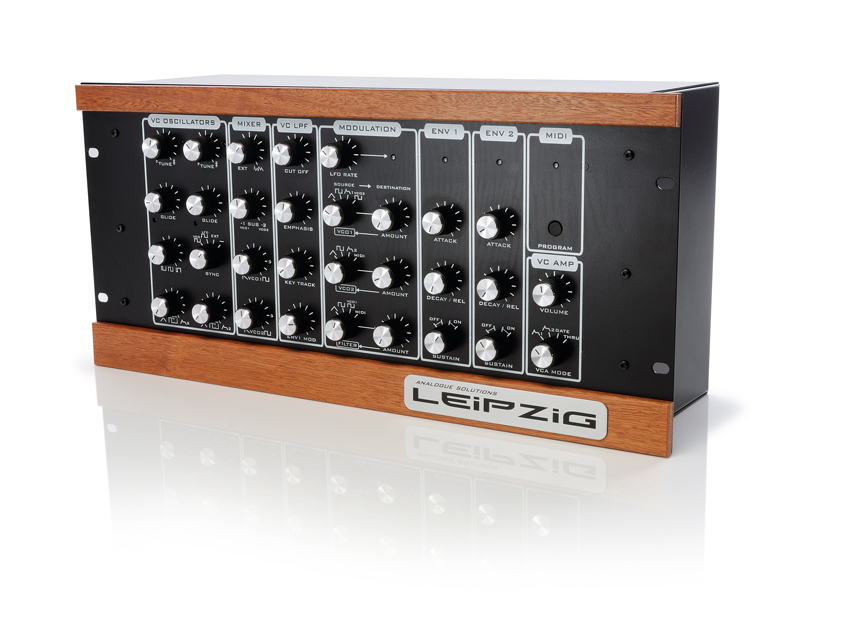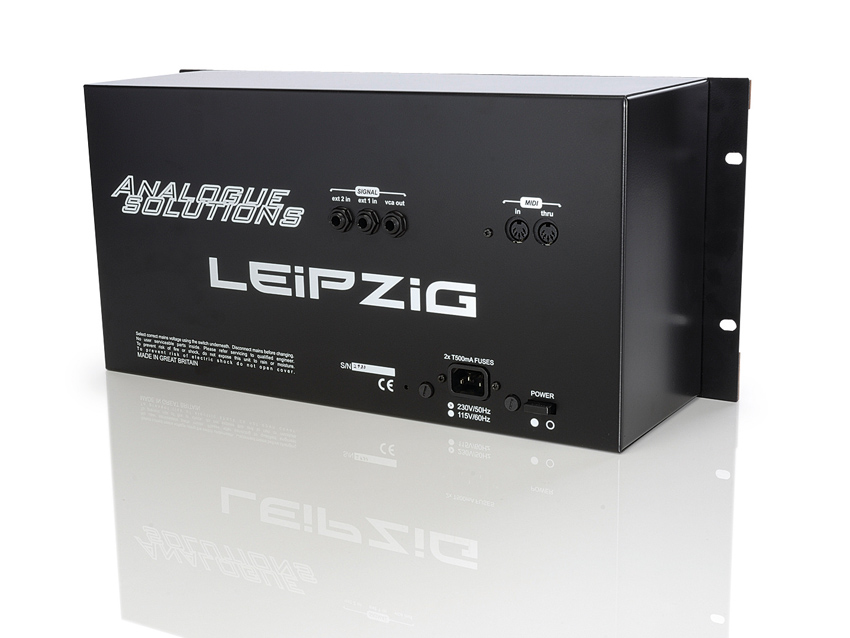MusicRadar Verdict
A great-sounding and versatile monosynth that can hold its own with the classics of yesteryear.
Pros
- +
Hand-built using quality components. Stable tuning and versatile sound. MIDI I/O. External inputs. Comprehensive modulation section.
Cons
- -
No separate decay and release controls on the envelopes. Only sawtooth and pulse waveforms.
MusicRadar's got your back

Analogue Solutions Leipzig

Analogue Solutions Leipzig
The Leipzig is a 2-oscillator monosynth with MIDI, LFO and comprehensive modulation capabilities. With its black metal front and high quality wood panels, it looks very much like a rackmountable Minimoog. The controls are nicely spaced, while the unit itself feels solid and generally inspires confidence.
As far as design goes, our only small reservations apply to the labelling, which can be a little cryptic at times, though a quick refer back to the well-written manual soon clears everything up. Also, it would be nice if the tune controls had a centre detent, though the tuning does seem solid.
In detail
The two discrete VCOs have independent tune controls (for those phat detuned sounds we've all come to love! and there are separate glide controls for each of the oscillators, too.
Oscillator 1 has a separate pulse width control that applies to its square wave only. Oscillator 2 has a choice of sync controls for syncing with an external source, the LFO (so the LFO cycle resets the oscillator 2 waveform to its start point) or normal VCO sync.
Finally, each oscillator has a PWM control that can modulate the pulse width with a triangle wave or square wave in varying amounts. Thankfully, this section of the synth is quite simple to use once you get your head around the controls. Our advice is to turn the dials, use your ears and not get too bogged down with the technicalities!
The mixer is the heart of the Leipzig. Here, the two main VCOs can be mixed, white noise can be added and external sound sources plugged into the back of the Leipzig can be blended in. There are two blue LEDs to signal the frequency response of the oscillators - these are more for visual effect than anything else!
The available waveforms are restricted to sawtooth or pulse, (no sine) which is frustrating. However, when you factor in the pulse width controls in the Osc section, there is plenty of scope for sonic variation.
To beef up the sound, each oscillator also has its own sub-oscillator which can add one octave below (on Osc 1) or two octaves below (on Osc 2). The sub-oscillators are square waves and are very similar in principle and sound to those you'll find on Roland's classic Juno synths.
The filter is based on the classic Moog 24dB self-oscillating transistor ladder design and is very simple but effective. The controls are pretty standard issue: Cutoff, Emphasis (resonance), Key Tracking (so the filter opens brighter when you play higher up the keyboard) and an Env 1 control which allows the cutoff to be modulated by Envelope 1.
Speaking of which, there are two envelopes available on the Leipzig - each of these has a blue trigger LED. These are ASR (Attack/Sustain/Release) types and can be routed to various parts of the synth for modulation purposes or used as standard amp/filter envelopes as required.
The lack of a separate decay/ release control doesn't prevent you from making most types of sound, though some diehard synthesists may miss it. The sustain portions of each of the envelopes can be switched in or out as desired.
Summary
The Leipzig's sonic character lies somewhere between a Korg MS20 and a Moog monosynth, which isn't a bad place to be at all. It's certainly quite raw - it can be bright and brash but also smooth and dark.
When used in combination, the filter and oscillators can be smooth or aggressive as required and are suitable for all types of sounds. You can produce subtle smooth leads, heavily modulated effects and drum sounds, and deep and cutting basses.
In terms of sonics, then, the Leipzig can hold its own when compared to the best analogue monosynths. There are some areas in which it comes up short - no sine wave, no master tune dial, no headphone socket, no osc footage controls - but it makes up for these failings in other ways. What's more, it's sensibly priced.
Taste the Leipzig's analogue goodness by listening to these audio clips:
“I said, ‘Are we sure we can write a song about death?’”: The story of Mike + The Mechanics' classic No.1 The Living Years
“Without investment in music education our talent pipeline is at risk of drying up along with the huge opportunities for economic growth it brings”: UK Music draws up five point plan to “turbocharge” music education
“How daring to have a long intro before he’s even singing. It’s like psychedelic Mozart”: With The Rose Of Laura Nyro, Elton John and Brandi Carlile are paying tribute to both a 'forgotten' songwriter and the lost art of the long song intro









